| |
Calflora
Contributing Observations
(Help)
|
Search Applications
Observations
Places
Plants
|
What is Calflora?
Calflora is 1. a website you can use to learn about
plants that grow wild in California (both native plants and weeds); and
2. a nonprofit organization responsible for providing this service.
Calflora is run by
the team described below.
Information in Calflora comes from many sources:
the Consortium of California Herbaria, iNaturalist,
public agencies, nonprofits, scientists, private donors, and you!
(A list of all data sources is available
here.)
Find Out About a Plant
You can enter the common or scientific name of a plant to find out about it.
Or,
use the name wizard to just enter part of a name and have the wizard make suggestions. The result is an illustrated table of plants that match the name you entered. Click one of the plants in the table to learn the details about that plant — in particular, where it’s been observed in California.
Try it out!
Find Out What Plant Observations Have Been Made...
by a certain person, of a certain plant, in a certain area, or during
a certain time period.
The application that does this is called
Observation Search.
The observations that match your criteria
are displayed as colored icons on a Google Map.
Click on an observation to see photos and other details.
Try it out!
Find Out What Plants Grow in a Place
You can also choose a place and get an illustrated list of
the plants that grow there.
The application that does this is called
What Grows Here?.
You define "here" by picking a place on the map, or by choosing park boundary,
place name, etc. Refine "here" by zooming in and out of the map,
or drawing a polygon.
Then click SEARCH to get an illustrated list of plants known to grow "here."
Try it out!
There’s a lot more to Calflora than these basic tools --
you can learn about Calflora’s more advanced features
at the top of this page,
where you will find links to many web applications concerning
California plants.
|
Special Purpose Applications for Contributors
|
The Organization
Special Projects
The Database
|
The Calflora Team
|
|
|
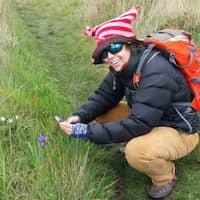
|
Cynthia Powell
is Calflora’s Executive Director. She graduated with her MS in GIS in 2010 forecasting Mokelumne River water supply based on MODIS remote sensing snow pack images. She’s been examining what was under that snow — plants — ever since. She coordinates all of Calflora’s programs, research, outreach, and advocacy, as well as fundraising and management.
|

|
John Malpas
lives in Sebastopol with his family.
Formerly at AT&T Bell Labs and Nomura Securities, he has two decades of experience wrangling applications
in many software technologies, the favorite being Java.
In his spare time he is a native plant gardener.
|
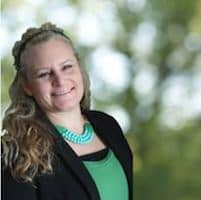
|
Michelle Tollett
is a Senior Biologist/Ecologist, ISA Certified Arborist,
and Environmental Educator, and is Calflora’s SoCal Communications and
Outreach Director. In this role she educates nonprofits, consulting firms, academics,
and the general public, in the many ways to use Calflora’s plant data. She is also
a volunteer Naturalist for Newport Bay Conservancy and Tejon Ranch Conservancy educating
students and the general public about conserving local natural resources.
|
 |
Ed Dorrington
is developing the Calflora & Android apps for
collecting plant observations in the field.
He is also helping to maintain and expand Calflora’s core technologies.
Ed has over 30 years of experience designing and building complex systems.
|
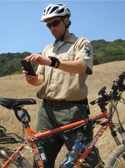 |
Pete Frye
leads the Weed Manager training program for Calflora. As a Resource Specialist with
Marin County Parks, Pete was involved in the design of Weed Manager from the early days.
He has a background in database design, decades of experience in habitat restoration,
and spent years managing large vegetation datasets with a team using Calflora tools.
|
 |
Foresta Sieck-Hill
is a bookkeeper for various nonprofits and worker-owned cooperatives across the state and country. She has been working on Calflora’s books since 2015. In her spare time, she likes to bicycle tour and swim in the SF Bay.
|
 |
Katherine Kunz
has worked as Calflora’s fundraising program consultant since 2017. She has two decades of experience in higher education and nonprofit fundraising. She holds a PhD from the University of Basel, Switzerland, and a professional coaching certificate from Leadership that Works.
|
|
The Calflora Board
| |
Cynthia Powell
|
| |
John Malpas
|
 |
Ron Vanderhoff
is currently Calflora's President of the Board. He is a botanist and professional horticulturist living and working in Southern California. He has has long affiliations with and held various positions with The California Native Plant Society, California Native Plant Council, Calflora and others. He is actively involved in understanding and documenting the status and distribution of the native and naturalized plants in the South Coast region. Ron is especially interested in rare plant conservation and the early detection and management of invasive plants and works collaboratively with agencies and land managers throughout the area. He is an avid collector and observer with numerous records on Calflora, the CCH, and iNaturalist. He believes that the sharing of information is essential to our enjoyment, understanding and conservation of California's flora.
|
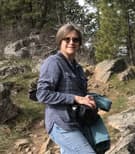 |
Jutta C. Burger
is the science and conservation program director for the California Invasive Plant Council (Cal-IPC) and worked previously at the Irvine Ranch Conservancy as a land manager. She grew up in Washington and received her degrees at Washington State University, University of Nebraska, and UC Riverside, where she also worked in the Department of Entomology for several years. Jutta has had a career-long commitment to conservation, native plants and insects, and understanding the ecology, impacts, and effective management of invasive plants. Supporting Calflora’s valuable online tools to better map and track both native and invasive plants is part of that commitment. She also serves on the Board of Directors of Chavez Park Conservancy and the Contra Costa County IPM Advisory Committee, and, previously, on the Boards of the Orange County chapter of CNPS and Cal-IPC. Jutta joined the Calflora Board in 2018.
|
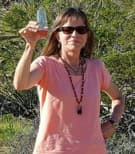 |
Julie Kierstead, M.S.,
retired Shasta-Trinity NF botanist, CNPS certified consulting botanist, affiliations with UCJEPS and California Academy of Sciences; focus on rare plants of NW California, and documenting the flora of the Klamath Ranges.
|
 |
John C. Game, D Phil.,
Research Associate, University of California Herbarium at Berkeley; Research Associate and Fellow, National Tropical Botanical Garden, Kauai.
|
 |
Sandy McCoy
lives in Berkeley. A past member of the CNPS board, he helped to establish the CNPS Planned Giving Program. He currently Board Chair of the Berkeley Symphony and has past board service on the board of American Friends of Canadian Conservation. He has a law degree from UC Law San Francisco. He attended Reed College. He is an avid hiker and an amateur botanist and birder.
|
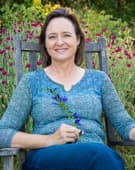 |
Ramona Robison
is a botanical consultant with over 30 years’ experience in the California flora. She specializes in invasive plant management and has a PhD in Plant Biology and a BA in Botany from UC Davis. She also co-manages a family ranch in eastern Sacramento County.
|
 |
Bob Marsh
Director of Inveneo: Inveneo delivers the tools of technology to those who need it most in the developing world.
|
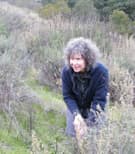 |
Sandy DeSimone
is director of research, education and land management at Audubon’s 4000 acre Starr Ranch Sanctuary in southeast Orange County. For both master’s thesis (Cal State Fullerton) then Ph.D.(UC, Davis) research focused on ecology of the globally endangered shrubland, coastal sage scrub.
|
 |
Mark Bowler,
a retired systems engineer and Orange County Parks volunteer with a life-long interest in nature and science, uses Calflora’s Weed Manager as he leads volunteer invasive plant management and restoration activities for Whiting Ranch Wilderness Park in close cooperation with Park Rangers and Resource Management specialists.
|
|
We ask you to Register
No one is required to pay for access to the data on Calflora.
But we do ask you to
register --
it helps us measure use
and to improve your experience of Calflora.
It also helps us when we ask foundations for support. Registering is free.
To register, click on LOGIN - REGISTER in the upper right corner of the home page,
and fill out the short form. It takes a minute.
As a contributor, you can take part in
another level of Calflora, which includes contributing observations,
commenting on other’s observations, participating in groups,
getting help with plant identification, etc.
Links to applications specifically for contributors
are typically shown in violet:
Plant Observation Entry.
Once you register,
please don’t let anyone else use your account.
(When more than one person uses the same account to contribute
observations, quality control becomes difficult for everyone involved.)
If you need to work closely with other contributors,
start a
group
and invite the others to join it.
Professional Use of Calflora
Organizations and consultants using Calflora for their work pay an annual service fee.
This fee is based on the organizations' number of users.
Please
contact Calflora for more information.
Thank you for Supporting Calflora
Financial contributions you make to Calflora are used for these purposes, amongst others:
Maintaining Calflora’s data infrastructure. This includes keeping up with plant name changes,
and adding new plants to the database that have recently been recognized in California.
Maintaining the various web applications. We are engaged in a constant process of finding and fixing bugs, and adding new features to applications such as
Observation Search.
Supporting users who have particular questions about how to use the search applications, or how to contribute data.
Maintaining the iPhone and Android phone applications and supporting infrastructure.
These phone apps are used by contributors to add observations to the database.
Contact us for Support
An important part of the service that Calflora provides is support.
We’re eager to answer any questions you have about any part of Calflora.
Write to us
and you’ll typically get a response in a few hours.
We’d also love to hear your ideas for making Calflora more useful to you.
Participate in the Calflora Community
We (the Calflora team) rely on
a community of interested and engaged users.
If you are interested in wild plants in California,
you are cordially invited to join this community.
For instance, if you are aware of a plant growing wild
in some park or other location where it is not yet
shown on Calflora, we urge you to register as a contributor and
to add an observation of that plant where you know it grows.
Equally important: if you notice information on Calflora
that seems wrong or incomplete, please
let us know.
If it is an observation record that does not look right
and you are a contributor, you can write a comment on the record.
We do pay attention to comments and answer emails.
In this sense, what you see on Calflora is the product of
the vigilance of many engaged users.
Volunteer Opportunities
Volunteers are an important part of
the ongoing quality assurance process. If you have the inclination
and a little bit of time, we would love to have your help.
Here are some particular volunteer jobs:
- Add new Great Places.
This job entails finding botanical hotspots that already have
many photo observations of native plants
(or that should have!). Then, visiting the place, finding out
who manages it, and finally entering that information into a Great Place record
on Calflora.
- Choose plant photos for the Taxon Report pages.
For some people, this job is the ultimate kind of fun,
because you get to look at lots of plant photos on Calflora and CalPhotos,
and answer these questions:
Are the available photos of a plant accurately identified?
Do the available photos of a plant show identification characteristics?
Which are the best photos of close-up characteristics (flowers, leaves, etc.)?
Which are the best photos showing the whole plant?
|
Trademarks
Calflora,
What Grows Here?,
Observation Search,
Weed Manager,
Calflora Observer,
and Observer Pro are trademarks of The Calflora Database.
|
Civil Rights
In accordance with Federal law and US Department of Agriculture policy, Calflora is prohibited from discriminating on the basis of race, color, national origin, sex, age, or disability. (Not all prohibited bases apply to all programs.)
To file a complaint of discrimination, write USDA, Director, Office of Civil Rights, Room 326-W, Whitten Building, 1400 Independence Avenue, SW, Washington, DC 20250-9419 or call (202) 720-5964 (voice and TDD). USDA is an equal opportunity provider and employer.
|
















